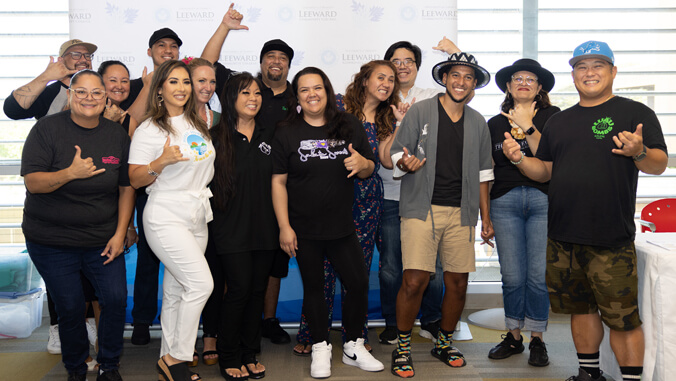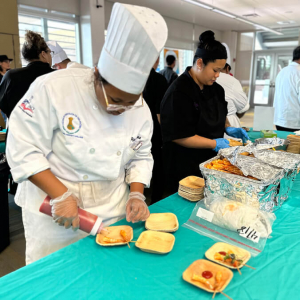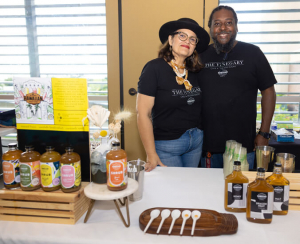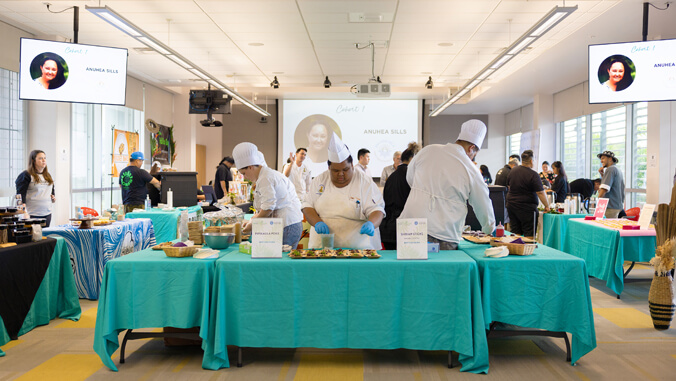
Every Monday and Wednesday evening through mid-July, springroll entrepreneur Philip Nguyen, owner of The Corner Rolls, will log onto Zoom classes to learn about a wide array of subjects ranging from self-care, time management and sleep to using commercial kitchens, packaging, recipe costs and food safety. He’ll be joined by 13 other food entrepreneurs who comprise the second cohort in Leeward Community College’s ʻĀina to Mākeke program.
Nguyen’s company has been serving up spring rolls with innovative flavors for two years.
“We currently have one van, one set of equipment and can only manage one market or one festival at a time,” Nguyen said. “I enrolled in the ʻĀina to Mākeke program to incubate my small business, to accelerate the growth of my business. I expect to gain knowledge, make meaningful connections and find guidance towards success.”
Nguyen’s short-term goal is to double the company’s equipment in order to manage two markets at the same time.
“My long-term hope for the business is to eventually have a brick and mortar where we serve flights of spring rolls paired with flights of beer,” he said.

In addition to workshop sessions, participants have private sessions with a business advisor coach and with other entrepreneurs over 12 weeks. In the fall, they’ll be able to continue—and significantly ramp up—their trajectory at the new Wahiawā Value-Added Product Development Center (WVAPDC).
A project of the State of Hawaiʻi and Leeward CC, the 33,327-square-foot, $22-million, state-of-the-art facility will be used by established and budding food entrepreneurs to create value-added products, such as pickles, sauces, vinegars and more, from local agricultural products, many of which would otherwise likely become waste.
First cohort
The first ʻĀina to Mākeke cohort comprised 15 companies that ran the gamut, including Sakata Sweets, Haleʻiwa Salt Co., Barrio Café 808 and The Disco Farmer. They held a successful, well-attended showcase in April, where buyers, grocers and media influencers learned about and sampled their products.
“The course has been designed to help entrepreneurs develop a deep understanding of the food industry and equip them with the skills and knowledge they need to succeed in the competitive food market,” said Instructor Christiane Bolosan-Yee. “I’m confident that the entrepreneurs who have completed our course are well-positioned to succeed. They’ve demonstrated a deep commitment to quality, innovation and sustainability, and are dedicated to creating products that not only taste great but also make a positive impact in Hawaiʻi and, hopefully, beyond our shores.”

One of those first cohort entrepreneurs, Poni Askew, is a well-known name in Oʻahu’s culinary and agriculture communities. She and her husband Brandon are champions of Honolulu’s local economy and since 2010 have created platforms—Makers & Tasters, Street Grindz, Eat the Street and Honolulu Night Market—that have supported hundreds of entrepreneurs.
In 2018, they established the Hawaiian Vinegar & Spice Company and recently opened a small shop with a tasting room in Wahiawā. The focus of their business, and the main reason they enrolled in ʻĀina to Mākeke, is a vinegar-based syrup called a shrub. Hawaiian Vinegar’s shrubs are infused with local herbs, fruits, vegetables and spices, with flavors such as guava lime, basil ginger and Mānoa honey. Shrubs are used to craft both cocktails and mocktails. They also give dressings, marinades, pickles and sauces a great twist of flavor. The Askews are currently creating new vinegars and shrubs made with malt vinegar from Lani Kai Brewery, dragon fruit from Kualoa Ranch, and banana vinegar using fruit from farms in Haleʻiwa.
Learning to scale

“A food manufacturing business is different from a service-based business,” Askew said. “There’s distribution, food science, food testing, lots of components we didn’t know about. And there’s going to be a point where, in order to scale, we’re going to have to finance our enterprise. Basically, we’re starting as new entrepreneurs.”
WVAPDC Manager Chris Bailey said the mission is to support and advance value-added entrepreneurs, students and local agriculture.
“The facility will have every imaginable piece of food manufacturing equipment,” Bailey said. “Twelve thousand square feet of the facility is a production floor. We’ll have the only high pressure processing machine in Hawaiʻi. It’s an alternative to pasteurization and a game changer in terms of product stabilization and extending shelf-life. We have a media kitchen, even an industrial bagel slicer.”
The Askews believe WVAPDC will be huge for their ability to scale. “We want to be there on day one,” they said.
For more information, visit https://www.leeward.hawaii.edu/wvapdc/ or contact Bailey at crbailey@hawaii.edu.


